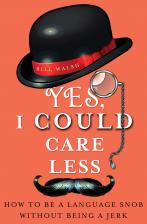Could Care Less
An excerpt from Bill Walsh’s book Yes, I Could Care Less.
Bill Walsh, Writing for
Listen
Could Care Less

In this corner are the sticklers, the prescriptivists. We are the copy editors, English teachers, usage mavens, armchair grammarians and others who revel in dos and don’ts and in our own opinions, who prescribe usage. If you’re a stickler, you deplore the idea of using could care less to mean couldn’t care less. What could be more obvious than a preference for saying what you mean over saying the exact opposite? “One of the surest ways to show the world that you are a slipshod stylist,” writes Charles Harrington Elster in The Accidents of Style, “is to write I could care less instead of I couldn’t care less.”.
In the other corner are the descriptivists who pooh-pooh our fun. Spoilsports. They emphasize that the language is what its speakers make it, and that speakers handle that responsibility just fine. They see the glass as half full, while we’re arguing over whether half full gets a hyphen. They are the linguists and those who have fallen under the linguists’ spell, the laissez-faire realists who take their pleasure in stepping back, hands off, and describing how language is used. Their only strong opinions are about those who have strong opinions. Jan Freeman, a self- described “recovering nitpicker” and former language columnist at the Boston Globe, calls the could care less issue “one of the great language peeves of our time.” Surveying a vast field of sticklers who “continue to insist that ‘I could care less’ really must mean ‘I care to some extent,’” she retorts: “But it doesn’t; it never has; it never will.”
Sifting through the claims and counterclaims about how couldn’t care less mutated into its literal opposite and just how wrong or perfectly fine that is, I find it telling just how often people feel the need to explain the literal meanings of the competing versions. Couldn’t care less is oblique. It’s an intentional double negative, as opposed to the ain’t-got-none kind, so processing the meaning requires a couple of seconds’ thought. (Who has time for that?) Complicating matters further if you’re the literal type, the original expression is hyperbolic.
Think about it: When someone says “I couldn’t care less” (or says “I could care less” and means “I couldn’t care less”), how often is the subject at hand truly the one thing that person cares least about in the whole wide world? You might say you couldn’t care less about the color of the dress that the first lady wore to the State of the Union address, but you’d be exaggerating for effect. I could no doubt come up with plenty of things you care even less about— maybe the color of the garment worn by a Bulgarian farm wife you’ve never heard of before and will never hear of again. Conversely and sort of perversely, saying “I could care less” would virtually always be literally true, even if it’s the opposite of what you meant.
Could care less was apparently born in the 1950s. Yes, another baby boomer! Ben Zimmer, the prominent language writer and former dictionary editor, found it in the Washington Post in 1955.
“Couldn’t care less,” interestingly, isn’t much older— Zimmer traces it to 1944. Jan Freeman dug up the earliest known complaint about the variant, a 1960 letter to Ann Landers. Ann sided with the complainer, to the extent that she cared about the issue (yes, she said that extent couldn’t have been less). For the next few decades, those who cared enough to write about the dispute agreed with her verdict, if not her lack of ardor. In his Miss Thistlebottom’s Hobgoblins
(1971), Theodore M. Bernstein of the New York Times bemoaned the “senseless abbreviated form” but observed that it “has not really taken hold.” Bernstein opined that people shorten the expression “because their hearing is defective or because they are in an inordinate hurry, or merely because they think it cute.”
Another Timesman, William Safire, was ready to write an obituary for “could care less” less than a decade later. “Happily,” he said in an On Language column included in a 1980 anthology, the expression “seems to be petering out,” having peaked in 1973. He pointed to the Harper Dictionary of Contemporary Usage, which called it “an ignorant debasement of the language.” (In the same entry, Freeman points out, Isaac Asimov said, “I don’t know people stupid enough to say this.” Ah, those were the days.) Safire concluded: “Farewell, ‘could care less’! You symbolized the exaltation of slovenliness, the demeaning of meaning, and were used by those who couldn’t care less about confusing those who care about the use of words to make sense.”
The eulogy was premature, and writing in the Times in 1983, Safire observed that “the short form is understood and the long form would be regarded as the sort of thing a visiting Martian might say.” But he wasn’t giving up; in the same column, he spun around to venturing that the phrase would atrophy from disuse.
If only. Safire and Bernstein are no longer with us, but could care less lives on, in speech and writing, in sticklers’ peeves and spoilsports’ rationalizations. The battle lines are predictable. The not- shy prescriptivist Robert Hartwell Fiske, in his Dictionary of Unendurable English, says, “However it is meant, whatever the speaker’s intention and inflection, the phrase could care less means just the opposite of the one it is so often misused for.” In his Common Errors in English
Usage, Paul Brians says, “People who misuse this phrase are just being careless.”
Bryan A. Garner, in his authoritative Garner’s Modern American Usage, disapproves of the expression but puts it at Stage 3 on his Language- Change Index, halfway between “rejected” and “fully accepted.” That means it’s “commonplace even among many well-educated people but is still avoided in careful usage.”
In Word Court, Barbara Wallraff defends the usage as an informal though illogical idiom but says it’s “not considered appropriate for formal speech or writing.”
Webster’s New World Guide to Current American Usage summarizes the history and concludes that “the efforts of conservative English- speakers are not likely to be successful, for could care less seems too well established to be dislodged now.”

